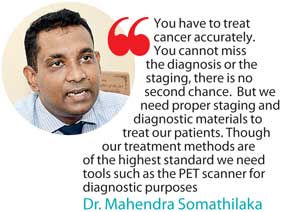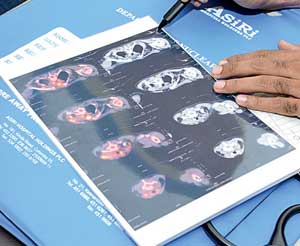Reply To:
Name - Reply Comment
 The Apeksha Hospital, also known as the Maharagama Cancer Hospital is badly in need of a PET CT scanner. So far only one private hospital has the facilities necessary to do PET scans. One scan costs around Rs.150,000 and during the course of treatment most patients need to undergo many scans but they cannot afford private scans.
The Apeksha Hospital, also known as the Maharagama Cancer Hospital is badly in need of a PET CT scanner. So far only one private hospital has the facilities necessary to do PET scans. One scan costs around Rs.150,000 and during the course of treatment most patients need to undergo many scans but they cannot afford private scans.
A PET CT scanner costs approximately Rs. 200 million. The lack of a PET CT scanner has caused complications and irregularities in the diagnosis of cancer. In other words, a PET scan would give hope of life to a person who would have otherwise succumbed to a deadly disease. As the Daily Mirror learnt, the PET scanner also helps to extend the quality of life of a cancer patient by preventing the wrong kind of treatment that might cause death instead of a cure.
Dr. Mahendra Somathilaka , consultant and paediatric oncologist, elaborated on what a PET scanner was and its primary mechanism:

“When the patient comes to us with a cancer, at the initial stage we need to find out where this particular cancer has spread.The cancer can be anywhere, the breasts, lungs bones etc... Without knowing the exact staging ( Spread)of the cancer, it is difficult to treat. Without staging, we may either overtreat or undertreat the patient. For example, if we assume that the cancer is isolated and confined to the lungs, we may under treat the cancer. In some cases the cancer has spread through out the body , and therefore is untreatable. However, due to the lack of a PET scanner we would be unaware of that and in these instances the patient can die from the side effects of the treatment rather than the disease itself. Therefore, it is extremely clear that the PET scanner is needed to observe the staging of cancer.
He added, “The dissemination of most cancers can be detected through the PET scan. To detect the area where the cancer cells subside, we take one glucose molecule and put a radioactive substance (for scanning purposes) in it and we inject it into the body. Cancer cells need more energy and thus are more active. Through the PET scanner we can identify where the cancer cells accumulate, as they consume the glucose. Therefore, the PET scan will show the exact location of the cancer.”
He also explained the difference between an MRI scanner and a PET scanner: “The mechanism of the two machines are completely different. The MRI scanner takes clear pictures of the soft tissues of the body, such as brain tissue, muscles and internal organs. But it only scans a specific area of the organ. The MRI shows the local infiltration of cancer whereas the PET scans the whole body and detects the lesions.”

He further stated another advantage of using a PET scanner for cancer: “We can do the PET scan in different intervals of the disease (before and after treatment). This shows the effectiveness or ineffectiveness of the treatment. If treatment is successful, we will continue giving treatment until the cancer is completely eradicated from the body. If ineffective, we will change the treatment or use surgery or radiology to extract the remaining cancer cells.”
In conclusion, Dr. Somathilake said: “I want the public to know that cancer is just an umbrella term. Many believe that there is no cure for cancer, but that is incorrect. Some cancers are curable and some are not. Majority are actually curable. For example childhood leukaemia in Sri Lanka is 80% curable and in developed countries it is just above 88% . But compared to other solid tumours Sri Lankan figures do not compare well with western and developed countries. One reason for this difference is the lack of PET scanning
“You have to treat cancer accurately. You cannot miss the diagnosis or the staging, there is no second chance. But we need proper staging and diagnostic materials to treat our patients. Though our treatment methods are of the highest standard we need tools such as the PET scanner for diagnostic purposes. Therefore, the PET scanner will truly save lives as it breaches the bridge between treatment and diagnosis. Roughly 40 to 50 paediatric patients needed PET scans last year but only 3 could afford it and most of the patients would need multiple scans during their treatment period and even afterwards.”
Inspired by the hospitality of the hospital staff and humbled by the plight of his son, Mr. Mohamed, the president of the Kadijah Foundation, a non-profit organisation which has pledged to raise the necessary sum of money to obtain a PET CT scanner for the Maharagama Cancer Hospital said, “When my son was diagnosed with cancer I took him to India and we consulted American and Singaporean doctors but to no avail. I’ve spent millions of rupees abroad for his treatment. At the end I walked into the Apeksha Hospital and indeed it has been a blessing. We find the same quality treatment here that we found elsewhere for an enormous sum of money.”
“However it was brought to my notice that the Apeksha Hospital was in dire need of a PET scanner. I know the importance of a PET scan because my son has taken around 10 or 12 such scans. It is a necessary machine when diagnosing and treating cancer,” he added.
To some, the Apeksha Hospital is far from being a symbol of hope as the thought of cancer only brings woeful memories. But our generous donations could ease and end their suffering and offer another moment, another day, and another year of life. As Ralph Waldo Emerson, the American essayist and poet once said: “You cannot do a kindness too soon, for you never know how soon it will be too late.” This is your moment to help thousands retrieve their precious lives. Donors are kindly requested to send donations only to the following bank account number of the official National Cancer Centre, Maharagama and not by any other means.